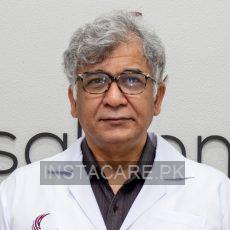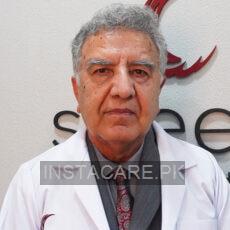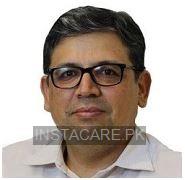Intestinal Obstruction - Symptoms, Risk factors and Treatment
Last Updated On Tuesday, March 3, 2026
Intestinal Obstruction in Urdu
آنتوں میں رکاوٹ ایک ایسی حالت ہے جس میں آنتوں میں میکانکی یا فعال رکاوٹ ہوتی ہے جو آنتوں کے مواد کی معمول
کی حرکت کو روکتی ہے۔
پیٹ کے چپکنے سے مختلف اعضاء کے درمیان داغ کے ٹشو (فبروس بینڈ) کی تشکیل ہوتی ہے۔ پیٹ کی سرجری کے بعد چپکنے کا عمل عام طور پر ہوتا ہے۔ یہ اکثر آنتوں کے لوپس کے درمیان ہوتے ہیں، انہیں پیریٹونیم (پیٹ کی اندرونی تہہ) سے جوڑتے ہیں۔ جب آنتیں پیریٹونیم سے چپک جاتی ہیں، تو ان کی معمول کی حرکت محدود ہو جاتی ہے، جس کے نتیجے میں آنتوں میں رکاوٹ پیدا ہوتی ہے۔
Intestinal Obstruction in English
Intestinal obstruction is a condition in which there is a mechanical or functional blockage in the intestines that prevents the normal movement of the bowel contents.
What causes intestinal obstruction?
The most common causes of intestinal obstruction are:
Adhesions: Abdominal adhesions refer to the formation of scar tissue (fibrous bands) in between different organs. Adhesions most commonly occur after abdominal surgery. They frequently take place between loops of the intestines, attaching them to the peritoneum (inner layer of the abdomen). When the intestines are glued to the peritoneum, their normal movements are restricted, thereby resulting in an intestinal obstruction.
Hernia: Hernia means when an organ or tissue in your body protrudes through a weak spot in your muscles. Part of your bowel, such as the intestine may get trapped in the hernia and cause bowel obstruction. It blocks the normal movement of the food down the intestine.
Tumors: many tumors and cancers can cause intestinal obstruction such as cancers of the stomach, colon, small intestine, uterus, urinary bladder, prostate, liver, etc. As cancer increases in size and spreads in the abdomen, it can compress on the intestines causing an obstruction.
Other causes:
Other general causes of intestinal obstruction include:
Diverticulitis: diverticulitis is an inflammation of the diverticula- abnormal pouches around the intestines, especially the colon. When diverticulitis heals, it may form scar tissue around the colon- known as colon stricture. Over time, this colon stricture can tighten and narrow the intestine, causing intestinal obstruction.
Volvulus: A volvulus is when a loop of the intestine twists around itself along with the mesentery. The mesentery is a membrane that surrounds the intestines. When a loop of the intestine twists along with the mesentery, it results in a closed-loop causing intestinal obstruction.
Intussusception: Intussusception is a condition in which a part of the intestine slides into the adjacent part of the intestine causing intestinal obstruction. It can also cut off the blood supply to the intestine (intestinal ischemia) causing the death of the affected part of the intestine.
Foreign bodies: Intestinal obstruction can also be due to a foreign body stuck in the intestine. Objects such as coins, batteries, etc. can be stuck in the intestines if ingested and can occur in children or mentally deranged people. Gallstones can also cause intestinal obstruction if a pathway between the gallbladder and intestine ( fistula) is formed through which gallstones enter the bowel.
Fecal impaction: It is a condition in which chronic constipation occurs, and the patient does not pass stool for many days. The stool can build up in the intestines, and cause obstruction. It commonly affects the lower intestines and is seen more commonly in the elderly.
Symptoms of intestinal obstruction:
- Abdominal pain around the belly button or the upper side of the abdomen.
- Abdominal cramps that come and go
- Obstipation- inability to pass gas and stool
- Decreased appetite
- Nausea and vomiting
- Diarrhea
- Abdominal swelling
Complications of intestinal obstruction:
The complications of intestinal obstruction include:
Intestinal necrosis: This is when the affected segment of the intestine dies due to a lack of blood supply. This can cause intestinal perforation- a condition in which a hole forms in the intestine, which can, in turn, cause the bowel contents and bacteria to leak out.
Peritonitis: Refers to inflammation of the abdominal cavity. It can occur as a consequence of intestinal perforation and the spread of bacteria in the abdominal cavity. It is a life-threatening condition and requires urgent treatment.
Sepsis: Sepsis is a response to an infection that spreads throughout the body. Peritonitis can progress to sepsis. In sepsis, the patient’s blood pressure can fall too low (septic shock), causing damage to organs (multiple organ damage) such as the heart, liver, kidneys, and can ultimately cause death. Death is rare due to intestinal obstruction.
Treatment:
The treatment of intestinal obstruction generally involves medications and surgery. Surgery is done to correct the defect which is causing intestinal obstruction. Medical treatment may involve the following:
- IV fluids to correct dehydration
- Painkillers to relieve pain
- Antiemetics to reduce nausea
- Antibiotics to clear any infection








